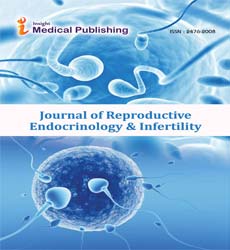Male Infertility and Hormonal Imbalances: Diagnostic Approaches and Therapeutic Advances Assisted
Widra Augustine*
Department of Reproductive Endocrinology and Infertility, Department of Gynecology and Obstetrics, Emory University, Atlanta, Georgia
Published Date: 2025-02-28Widra Augustine*
Department of Reproductive Endocrinology and Infertility, Department of Gynecology and Obstetrics, Emory University, Atlanta, Georgia
Corresponding author:
Widra Augustine,
Department of Reproductive Endocrinology and Infertility, Department of Gynecology and Obstetrics, Emory University, Atlanta, Georgia,
E-mail: widra@augustine.ge
Received date: February 01, 2025, Manuscript No. ipjrei-25-20620; Editor assigned date: February 03, 2025, PreQC No. ipjrei-25-20620 (PQ); Reviewed date: February 15, 2025, QC No. ipjrei-25-20620; Revised date: February 22, 2025, Manuscript No. ipjrei-25-20620 (R); Published date: February 28, 2025, DOI: 10.36648/ipwhrm.10.1.67
Citation: Augustine W (2025) Male Infertility and Hormonal Imbalances: Diagnostic Approaches and Therapeutic Advances Assisted. J Reprod Endocrinol Infert Vol.10 No.1: 67.
Introduction
Male infertility, a major contributor to reproductive health challenges, is increasingly linked to hormonal imbalances that affect spermatogenesis, libido, and overall reproductive capacity. Advances in diagnostic imaging, biochemical assays, and molecular techniques have improved the identification of hormonal dysfunctions, while evolving therapeutic strategies, including medical, surgical, and assisted reproductive technologies offer renewed hope for affected individuals [1].
Description
The diagnostic evaluation of male infertility with suspected hormonal imbalance begins with a detailed medical history, physical examination, and baseline semen analysis. Hormonal profiling, including measurement of Follicle-Stimulating Hormone (FSH), Luteinizing Hormone (LH), prolactin, thyroid hormones, and testosterone, is essential in distinguishing between primary testicular failure and secondary causes related to pituitary or hypothalamic dysfunction [2].
Advanced diagnostics such as Magnetic Resonance Imaging (MRI) for pituitary abnormalities, genetic testing for Klinefelterâ??s syndrome or Y-chromosome microdeletions, and molecular assays for receptor defects further enhance diagnostic accuracy. These approaches facilitate personalized treatment strategies and reduce the risk of misdiagnosis [3].
Therapeutic advances in managing male infertility associated with hormonal imbalances primarily focus on restoring hormonal equilibrium and optimizing spermatogenesis. Medical interventions such as gonadotropin replacement therapy for hypogonadotropic hypogonadism, selective estrogen receptor modulators (SERMs) to stimulate endogenous testosterone production, and aromatase inhibitors to reduce estrogen excess are widely dopamine agonists effectively normalize prolactin levels and improve reproductive function. Men For patients unresponsive to medical therapy or with severe testicular dysfunction, assisted reproductive technologies provide alternative pathways to parenthood. Intracytoplasmic Sperm Injection (ICSI), sperm retrieval techniques, and cryopreservation strategies have revolutionized the treatment of male infertility, even in cases of severely compromised sperm production[4].
Advances in genetic testing and molecular diagnostics have facilitated personalized treatment approaches, allowing clinicians to identify underlying etiologies and tailor therapies accordingly. Lifestyle modifications, including optimization of diet, exercise, and avoidance of environmental toxins, further contribute to improved reproductive outcomes [5].
Conclusion
Male infertility associated with hormonal imbalances presents complex diagnostic and therapeutic challenges but can be effectively managed through a combination of advanced diagnostic tools, targeted hormonal treatments, and cutting-edge assisted reproductive technologies. The integration of precision medicine into reproductive endocrinology continues to enhance outcomes, offering men affected by hormonal infertility renewed opportunities for biological parenthood. Future therapeutic innovations, particularly in regenerative medicine, may transform the landscape of male infertility management and provide long-term solutions to this growing public health concern.
Acknowledgement
None.
Conflict of Interest
None.
References
- Hefler-Frischmuth K, Walch K, Huebl W, Baumuehlner K, Tempfer C, et al. (2010) Serologic markers of autoimmunity in women with polycystic ovary syndrome. Fertil Steril 93: 2291-2294
Google Scholar Cross Ref Indexed at
- Novais Jde S, Benetti-Pinto CL, Garmes HM, Jales RM, Juliato CR (2015) Polycystic ovary syndrome and chronic autoimmune thyroiditis. Gynecol Endocrinol 31: 48-51
Google Scholar Cross Ref Indexed at
- Glueck CJ, Goldenberg N (2019) Characteristics of obesity in polycystic ovary syndrome: Etiology, treatment, and genetics. Metabolism 92: 108-120
Google Scholar Cross Ref Indexed at
- Cockwell H, Wilkinson DA, Bouzayen R, Imran SA, Brown R, et al. (2013) KISS1 expression in human female adipose tissue. Arch Gynecol Obstet 287: 143-147
Google Scholar Cross Ref Indexed at
- Ben-Rafael Z, Orvieto R (1992) Cytokines-involvement in reproduction. Fertil Steril 58: 1093-1099
Open Access Journals
- Aquaculture & Veterinary Science
- Chemistry & Chemical Sciences
- Clinical Sciences
- Engineering
- General Science
- Genetics & Molecular Biology
- Health Care & Nursing
- Immunology & Microbiology
- Materials Science
- Mathematics & Physics
- Medical Sciences
- Neurology & Psychiatry
- Oncology & Cancer Science
- Pharmaceutical Sciences
